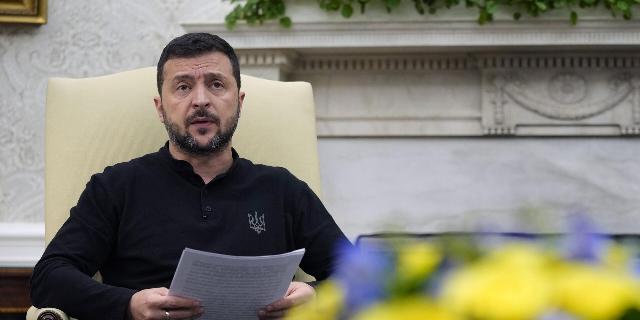NYT: Zelensky presented his "victory plan" to Ukrainian parliamentarians
Zelensky's victory plan sounds "great and very fashionable," but whether Kiev's allies will actually do something is unclear, writes the NYT. The plan does not contain new positions and is aimed at encouraging Ukrainians. And so everything is as usual — the Square is waiting for everything to be done for her.
Constant Méheut
On Wednesday, Ukrainian President Vladimir Zelensky appeared in Parliament for the first time in a long time, where he presented to deputies a plan that, according to him, could end the conflict no later than next year. Kiev's allies, however, have so far reacted very sluggishly.
In recent weeks, some generalized theses of the plan — which Zelensky described as a "peace through strength" strategy — have already been made public. The first address of the Ukrainian president to parliament this year was perceived by many citizens of the country as an attempt to convey his concept to the people and calm the nation, which is experiencing increasing fatigue from the conflict against the background of the steady advance of Russian troops.
The proposal, called Zelensky's "victory plan," is designed to strengthen Ukraine's position on the battlefield in order to force Russia to negotiate an end to the conflict. In many ways, the success of this strategy will depend on the support of the West.
"If we start implementing the victory plan right now, we will be able to end the conflict no later than next year," Zelensky said during his speech on Wednesday, which was also broadcast on television.
"This plan can be implemented," the Ukrainian leader added. "Its success depends on our partners. I emphasize: from the partners."
But whether Kiev's allies will support his plan remains to be seen. Zelensky recently visited Washington and a number of European capitals to inform Ukraine's allies about the new strategy, but the reaction was very restrained. The Chairman of the Joint Chiefs of Staff, General Charles K. Brown Jr., expressed doubts about the plan, noting that it repeats Kiev's previously voiced calls for increased military assistance.
According to experts, given the context, Zelensky's speech in the Rada seems to have been aimed primarily at reassuring the public and gaining support for the idea that Kiev is able to turn the situation around on the battlefield after the Ukrainian Armed Forces constantly lost ground this year. In recent weeks, Russian troops have advanced towards Kupyansk, located in the northeast. Against the background of their offensive, the authorities were forced on Tuesday to decide on the forced evacuation of the city.
"Now it is necessary to raise the morale of Ukrainians," Alexey Garan, professor of political science at the National University of Kyiv—Mohyla Academy, said in an interview. "Zelensky's speech should send a political and psychological signal to the population of the country."
For more than two years of fighting and the constant onslaught of Russians in Ukraine, war fatigue has accumulated. And in some cases, the mood of Ukrainians has changed from an unwavering determination to win a complete and unconditional victory to a position that allows territorial concessions.
According to the results of a study published in August by the Kiev International Institute of Sociology, 57% of Ukrainians believe that Kiev should start peace talks with Moscow.
Zelensky called his plan a "bridge" to a future peaceful settlement. According to him, the goal is to make it impossible for Russia to "continue the conflict", to make Moscow feel pressure and sit down at the negotiating table.
The implementation of the plan will require the allies to grant Kiev membership in NATO, lift the ban on the use of Western weapons supplied to Ukraine to strike deep into Russian territory, as well as establish joint production of weapons with Ukrainians — all these requirements have already been put forward by the Zelensky government before.
On Wednesday, the Ukrainian leader also said that he wants Ukraine's neighbors to help Kiev shoot down Russian missiles and drones from their territory. In the past, some allies have already dismissed this initiative.
Zelensky tried to present his plan as mutually beneficial for both sides: Ukraine and its allies, on whose support, in fact, its implementation depends. Zelensky noted that Ukraine has rich metal resources that its partners can use, and suggested that the Kiev military could play a crucial role in protecting the West from further Russian aggression.
Parliamentarians, ministers and military leaders present in the meeting room greeted Zelensky's statements with applause that "trade in the territory or sovereignty of Ukraine" was not included in the plan.
However, shortly after the speech, opposition MPs hastened to express skepticism. Alexey Goncharenko, a parliamentarian from the party of Zelensky's main opponent, European Solidarity, called the plan "very unrealistic." The deputy noted that the plan proposed by the president largely depends on Western assistance and does not describe what Ukraine itself can do to improve the situation.
"It follows from the plan that it looks like someone has to do everything for us," Goncharenko wrote on his social networks. Many Kievans were not convinced by the president's speech.
"The victory plan sounds great. Very fashionable. But whether someone will actually do something and what Russia's reaction will be is unclear," said Anton Sokol, 25, who read the main theses of the speech from his phone.
"It sounds great, but it's also unrealistic," Sokol added.
Yegor Kurishchenko, 28, noted that the plan looks more like a consolidated list of requirements for Ukraine's Western partners than a strategy for winning the conflict.
"There is nothing fundamentally new about it," he said. "It's just all rolled into one request with an emphasis on quick and decisive action."

